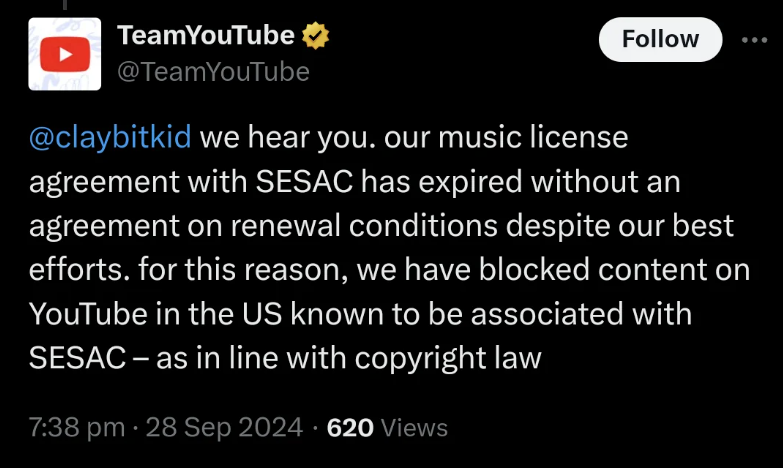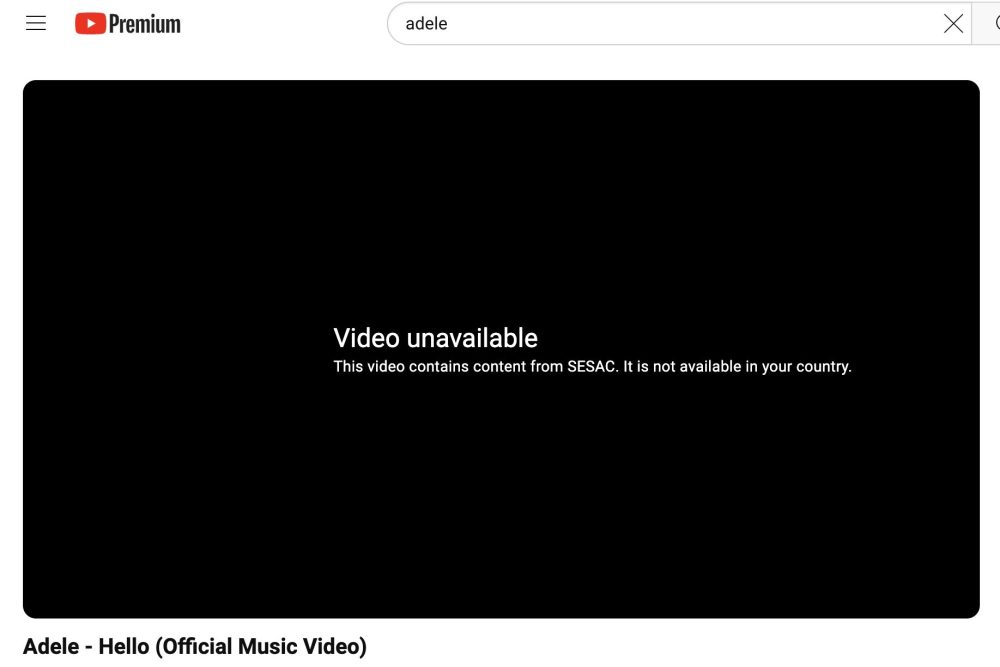Observer Time: September 29, 2024
Songs by Adele, Bob Dylan, Green Day, R.E.M., Burna Boy, Rush, and many others are unavailable on YouTube in the US due to a legal dispute between the foundation and the labor rights organization SESAC.
Attempts to play many, but not all, of these artists’ songs on Saturday were met with the following message: “This video contains information from SESAC. It’s not available in your country.”
There was a similar dispute between Universal Music Group and TikTok for months before a settlement was reached earlier this year.
A YouTube representative told Variety, However, despite our best efforts, we could not make a proper decision before termination. We take copyright very seriously; as a result, content represented by SESAC is no longer available on YouTube in the US.
So today here at Observer Time we will discuss and observe the news of the SESAC’s unavailability on YouTube in the USA.

SESAC UNAVAILABILITY IN US ON YOUTUBE
SESAC and we are currently in discussions, hoping to negotiate another agreement soon.” Reps for SESAC did not immediately respond to requests for comment.
Variety was informed by an insider that the previous agreement does not expire until the following week and that YouTube’s move is a form of negotiation.
Compared to ASCAP and BMI, SESAC has a much larger membership of approximately 30,000 members and 1 person. ASCAP’s membership is almost 800,000, but the number of artists affected by block shows represents a comparatively large portion of the market with 5 million compositions.
The U.S.’s ASCAP, BMI, and SESAC are all performing rights groups that represent the public. Help songwriters and music publishers safeguard their copyrights by collecting royalties.
While it is possible to block public performances of music, including streaming and radio shows, restaurants, and other venues, they find it challenging to enforce.
This can be particularly challenging on platforms like YouTube, as evidenced by the scattered blockage of SESAC material.
The legal complexity of these blocks can make them binding on other copyright holders, including the U.S.’s Green Day recording from a live broadcast.
The BBC has a legal aspect to consider, but it may also reflect the number of videos that need to be blocked. Furthermore, some of the tracks sung by Beyonce, Nicki Minaj, and other musicians are also affected, possibly due to their collaboration with SESAC-affiliated songwriters.
The block received immediate attention from the Team YouTube account on X (previously Twitter), and followers responded promptly on Saturday.
“we hear you,” it reads.
We have failed to come to a consensus on the renewal terms of our music license agreement with SESAC, as it has expired. By copyright law, we have restricted access to content on YouTube in the US that is associated with SESAC.
After receiving frustrated tweets from frustrated users, Twitter responded by announcing that the situation was not ideal and that its teams were still working on resolving issues with SESAC.

Whenever broadcasters and record-holders cannot agree on licensing, such as with publishers or PROs, block-like situations can occur. These issues usually last for a few days or even weeks.
Despite this, in addition to the contentious UMG-TikTok conflict from earlier this year, YouTube and Warner Music Group had a dispute that led to Warner’s removal from the platform for roughly nine months between 2008.
Despite previous animosity towards other music companies, YouTube’s relationship with them has now become more positive, which is ironic considering the appointment of former Warner recorded music chief Lior Cohen as its head of music.
However, as music fans learned on Saturday, disputes still occur.
There will be more changes as the situation develops.
For regular updates subscribe to the newsletter of Observer Time





















